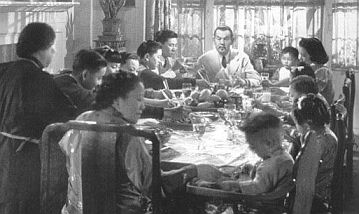The Charlie Chan Family Message Board
Welcome to our Message Board. Please feel free to post your thoughts, questions, or information.
I agree 100%, Rush. The "stereotype" that Charlie
represented included love of family, courtesy, hard
work, the importance of education, and the necessity
to think clearly and logically when attempting to
solve a problem.
Alas, the only real flaw in the Chan films is the
dreadful stereotyping of African Americans.
Robbie
Dear Robbie,
While the lot of black actors and actresses was not a happy one overall during the years surrounding the Charlie Chan series, I feel that we should note the great respect that Charlie Chan showed such persons as "Snowshoes" in "Charlie Chan in Egypt" and "Streamline" Jones in "Charlie Chan at the Race Track." The detective made sure to address each of these gentlemen with an article placed before their names, a rarety, to be sure, in that day! "Efendi Snowshoes" and "Mister Streamline" was how Chan addressed both of them.
During the Monogram era, Birmingham Brown was introduced into the mix in the hopes that he would help to attract African Americans to the theaters when Charlie Chan movies were shown! In that day, the antics of Mantan Moreland, Ben Carter, and others, were enjoyed by black audiences, as I understand it. Also, I believe that Steppin Fetchit ("Showshoes" from "CC in Egypt") was one of if not the first black millionare, so, it may be assumed, perhaps that he laughed a bit on his way to the honorable bank.
Agreed, blacks were not treated well both in American society or in the movies during the 1930s and '40s when the Charlie Chan series flourished. However, I feel that we can note a few bright spots within these films that may have, in some small way, helped to eventually usher in a much brighter future.
Sincerely,
Rush Glick
Dear Rush,
It's quite true that Charlie treated people of color
with far more respect than did many folks in real
life at that time. Perhaps African Americans found
Stepin Fetchit and Mantan Moreland's antics amusing,
because they themselves had progressed far beyond
such stereotypes. The son of our local Chinese
laundryman was my first "boyfriend" (age 5), and when
we watched the Chan films at his house, his father
would point out when Charlie misquoted one of the
ancient Chinese sages. This did not stop his family
from greatly enjoying the films! 
Warm regards,
Robbie
Dear Robbie,
How wonderful that the father of your early "boyfriend" watched Chan with the such a good spirit. I find it wonderful that he "corrected" Mr. Chan's misquotation, and what a great way for young children, such as you and his son were then, to be exposed to an aspect of Chinese culture in that way. I feel that if the misguided detractors of Charlie Chan approached their differences of opinion in a similarly creative manner, not only would our world be a bit more tolerant, but they, too, could allow Chan to actually continue to promote Chinese culture to fans both new and old.
My hat is off, years after the fact, to your friend's father... 
Sincerely,
Rush Glick
Dear Rush,
Mr. Wong had been a lawyer in Shanghai, but although
his English was quite fluent, he had no desire to
practice law over here. I will always remember the
Chan-like aphorism he gave us following a discussion
about ancestor worship. "Pride in ancestors is no
substitute for good character in oneself".
Warm regards,
Robbie
Hi,
I've said this before, but I don't think there was anything inherently negative or insensitive in Mantan Moreland's appearances.
Mantan was a very funny and capable actor who was used effectively for comic relief. He just happened to be black. His antics aren't any different than those of many other comically oriented actors such as Lou Costello or Herbert Mundin or Huntz Hall all of whom just happened to be white.
Why can't funny just be funny without having to analyze the role of the actor's race, religion, or ethnicity?
Mantan was also given a prominent and meaningful role in the series and was a large contributor to the popularity of the Monograms. To be honest, it is insulting to his memory for a modern day analyst to demean his contributions by placing racial overtones to them.
Regarding Snowshoes and Streamline, Rush's assessment is dead on. Lincoln Perry laughed all the way to the bank during his career and topped it off by receiving the NAACP's "Image" award.
Steve
Dear Steve,
Another thing comes to mind regarding racial issues and movies: How will future generations view the black ("comedies," etc.) and Asian (mattial arts) "exploitation" films that are being pumped out today by movie studios? Stereotypes galore... 
Sincerely,
Rush
